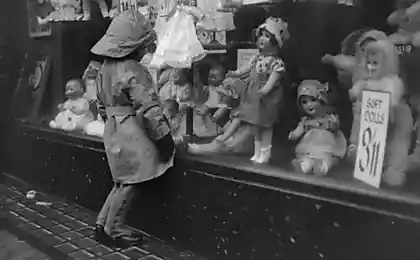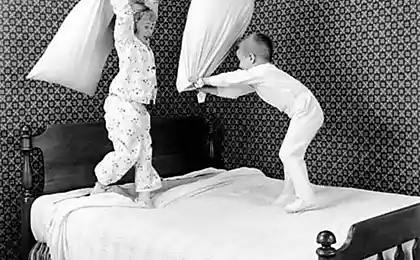513
Phrases that you don't tell a child
Sometimes we automatically say something to my kids, absolutely no hesitation on frequently used family things. These phrases passed down from generation to generation, flies from the tongue easily and discreetly, and often cause serious damage to the formation of a child. Moreover, the phrase at first glance may look completely harmless, but nevertheless... it is better not to repeat.
Sometimes we automatically say something to my kids, absolutely no hesitation on frequently used family things. These phrases passed down from generation to generation, flies from the tongue easily and discreetly, and often cause serious damage to the formation of a child. Moreover, the phrase at first glance may look completely harmless, but nevertheless... it is better not to repeat.

Leave me alone!
Variants of this message can be many: "leave me alone", "don't bother", "I'm busy", "go away, let me do their business" and so on. As a result of frequent uttering these phrases, the child develops a model of parent-child relationships in which his place is not the first. In the future it will inevitably affect the relationship between parents and grown children. In the most difficult cases a message of "get out of here, do not bother" can be interpreted literally by the child: the child is a nuisance, they do not value, he dream to get rid of.
You're so...
Label, hung on the child as a child with high probability will have an impact on the formation of character. Even in the diminutive form, such a label would inevitably cause harm. "Silly", "naughty", "lazy" is just that, better not to use in communicating with children. And in any case can not repeat these words several times. Especially psychologists advise to avoid negative labels, though the impact of neutral and positively painted "nicknames" are still not fully understood.
Why can't you be like ...?
Such comparisons with her sister, brother, neighbor's child or someone else is dangerous not only to those that can bear long-term resentment and jealousy, but the fact that they are able to provoke a negative reaction and reluctance to do what you want from the child.
Hurry up
It is clear that very often such a phrase sounds in a time when parents rush. At such moments, want to keep the baby moving as quickly as possible, and he, as luck would have it, digging and fumbling, distracted by everything. It is possible that the same behavior in your quieter moments doesn't cause your irritation, and you don't even notice. If the phrase is pronounced constantly irritated or accusatory tone, it makes the child feel that the parent is displeased with him that he is causing inconvenience. If this situation is repeated daily or even several times a day, to anything good it will not. The least drop in self-esteem of the child, and sometimes protest behavior.
Well done!
What bad can be in this widespread promotional replica? However, psychologists say that if you often use the same phrase as a praise, it becomes depersonalized, devalued. The child begins to perceive it as a mechanical response, and on a subconscious level ceases to give it any value. That is, mechanically said, "good" equals in his perception the complete absence of any praise. So even to praise the child each time differently, not using the same terms.
Let me help you, you can't do it
Psychologists believe that this phrase, repeated from day to day is programming the child to fail. He in advance prepared for the fact that he's not going to work, but mom will make. By the way, at a certain age the child begins a period of "I" during which the utterance of such a phrase may even provoke serious conflict!
Hey, just calm down!
Frequent change of the strict prohibition on the forced solution tells the child that in this way (whining, screaming, tantrums, whims) he may seek from the parents anything.
Now stop it!
Immediately shut up, now calm down, now, rather, who said... with anyone but baby you would not have allowed myself to speak in such a tone, right? Child this treatment is also offended, feeling more and completely powerless. And instead of "stop" and "calm down" he begins to protest. Kids cry and fuss, Teens leave "leave me alone" and keep to themselves. The result of such a phrase mom gets the opposite result: instead of "stop", the child only reinforces the unwanted behavior.
We do not buy — expensive (no money)!
Such a phrase implies that you would buy if money would be, but it's not always that way. It is best to explain to the child that it is not necessary to buy everything and the money should be treated rationally, because they are your family budget.
Not idle talk my nerves, my health is not iron!
Actually upset is not necessary and quite healthy mother or grandmother. But many parents often resort to such tricks as "high blood pressure" "heart disease" that the child has ceased to behave inappropriately. First, if you want your child to be honest with you, do not be fooled by it, and secondly, sooner or later he will become immune to such tricks and it is likely that when you really got somewhere, "prick", it just won't turn on this attention. In short, don't mess with such things.
You're a girl (boy), and they do!
Girls must be neat, not to play football, not to climb fences, but the boys must not cry and must be strong. The imposition of such stereotypes from an early age will not lead to anything good. So, as an adult, the boy will be ashamed of their emotion or lack of physical endurance, and the girl will be shy about their appearance or "masculine" work. It can happen and the reverse reaction, when in spite of your eternal the pink bows and dresses teenage girl will not come out of jeans and get a not at all feminine manners. Let the children be children, do not deprive them of this joy.
Don't worry, it's all nonsense!
For you, it can and nonsense, of course, but for a child it can be a very important and significant. Took away a toy, laughed at the garment or the act, not taken in the team play, so little children is trouble. If you always dismiss this and call bullshit, it will eventually lose credibility and your grown child is unlikely to come to talk about their not children's problems.
It happens again — you'll get it!
The thing is that after pronouncing a phrase, to punishment, as a rule, does not reach. And all restrictions on watching TV or the deprivation of ice cream postponed for another time. And if the hundred and first time you did fulfill threat, the pedagogical effect it definitely will not have, will most likely cause confusion and resentment. The child should know what to expect in doing so anyway.
source: hacklive.ru
Source: /users/1077
Sometimes we automatically say something to my kids, absolutely no hesitation on frequently used family things. These phrases passed down from generation to generation, flies from the tongue easily and discreetly, and often cause serious damage to the formation of a child. Moreover, the phrase at first glance may look completely harmless, but nevertheless... it is better not to repeat.

Leave me alone!
Variants of this message can be many: "leave me alone", "don't bother", "I'm busy", "go away, let me do their business" and so on. As a result of frequent uttering these phrases, the child develops a model of parent-child relationships in which his place is not the first. In the future it will inevitably affect the relationship between parents and grown children. In the most difficult cases a message of "get out of here, do not bother" can be interpreted literally by the child: the child is a nuisance, they do not value, he dream to get rid of.
You're so...
Label, hung on the child as a child with high probability will have an impact on the formation of character. Even in the diminutive form, such a label would inevitably cause harm. "Silly", "naughty", "lazy" is just that, better not to use in communicating with children. And in any case can not repeat these words several times. Especially psychologists advise to avoid negative labels, though the impact of neutral and positively painted "nicknames" are still not fully understood.
Why can't you be like ...?
Such comparisons with her sister, brother, neighbor's child or someone else is dangerous not only to those that can bear long-term resentment and jealousy, but the fact that they are able to provoke a negative reaction and reluctance to do what you want from the child.
Hurry up
It is clear that very often such a phrase sounds in a time when parents rush. At such moments, want to keep the baby moving as quickly as possible, and he, as luck would have it, digging and fumbling, distracted by everything. It is possible that the same behavior in your quieter moments doesn't cause your irritation, and you don't even notice. If the phrase is pronounced constantly irritated or accusatory tone, it makes the child feel that the parent is displeased with him that he is causing inconvenience. If this situation is repeated daily or even several times a day, to anything good it will not. The least drop in self-esteem of the child, and sometimes protest behavior.
Well done!
What bad can be in this widespread promotional replica? However, psychologists say that if you often use the same phrase as a praise, it becomes depersonalized, devalued. The child begins to perceive it as a mechanical response, and on a subconscious level ceases to give it any value. That is, mechanically said, "good" equals in his perception the complete absence of any praise. So even to praise the child each time differently, not using the same terms.
Let me help you, you can't do it
Psychologists believe that this phrase, repeated from day to day is programming the child to fail. He in advance prepared for the fact that he's not going to work, but mom will make. By the way, at a certain age the child begins a period of "I" during which the utterance of such a phrase may even provoke serious conflict!
Hey, just calm down!
Frequent change of the strict prohibition on the forced solution tells the child that in this way (whining, screaming, tantrums, whims) he may seek from the parents anything.
Now stop it!
Immediately shut up, now calm down, now, rather, who said... with anyone but baby you would not have allowed myself to speak in such a tone, right? Child this treatment is also offended, feeling more and completely powerless. And instead of "stop" and "calm down" he begins to protest. Kids cry and fuss, Teens leave "leave me alone" and keep to themselves. The result of such a phrase mom gets the opposite result: instead of "stop", the child only reinforces the unwanted behavior.
We do not buy — expensive (no money)!
Such a phrase implies that you would buy if money would be, but it's not always that way. It is best to explain to the child that it is not necessary to buy everything and the money should be treated rationally, because they are your family budget.
Not idle talk my nerves, my health is not iron!
Actually upset is not necessary and quite healthy mother or grandmother. But many parents often resort to such tricks as "high blood pressure" "heart disease" that the child has ceased to behave inappropriately. First, if you want your child to be honest with you, do not be fooled by it, and secondly, sooner or later he will become immune to such tricks and it is likely that when you really got somewhere, "prick", it just won't turn on this attention. In short, don't mess with such things.
You're a girl (boy), and they do!
Girls must be neat, not to play football, not to climb fences, but the boys must not cry and must be strong. The imposition of such stereotypes from an early age will not lead to anything good. So, as an adult, the boy will be ashamed of their emotion or lack of physical endurance, and the girl will be shy about their appearance or "masculine" work. It can happen and the reverse reaction, when in spite of your eternal the pink bows and dresses teenage girl will not come out of jeans and get a not at all feminine manners. Let the children be children, do not deprive them of this joy.
Don't worry, it's all nonsense!
For you, it can and nonsense, of course, but for a child it can be a very important and significant. Took away a toy, laughed at the garment or the act, not taken in the team play, so little children is trouble. If you always dismiss this and call bullshit, it will eventually lose credibility and your grown child is unlikely to come to talk about their not children's problems.
It happens again — you'll get it!
The thing is that after pronouncing a phrase, to punishment, as a rule, does not reach. And all restrictions on watching TV or the deprivation of ice cream postponed for another time. And if the hundred and first time you did fulfill threat, the pedagogical effect it definitely will not have, will most likely cause confusion and resentment. The child should know what to expect in doing so anyway.
source: hacklive.ru
Source: /users/1077
























